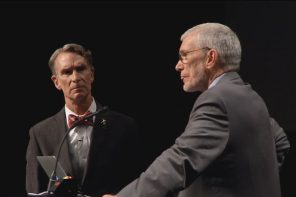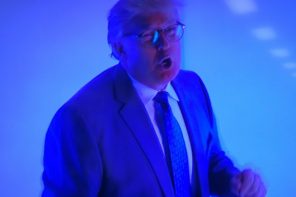There’s a new cottage industry devoted to explanations of the quasi-mystical appeal of Donald Trump. Is he a prosperity gospel preacher? A Platonic tyrant? Or is he a truth-telling jester?
At the Los Angeles Times, Peter Manseau recently tried to bring some critical theory to this exercise, arguing that Trump’s appeal is best explained through the French sociologist Émile Durkheim.
This kind of analysis can seem abstract. But as the public ritual of the Republican National Convention in Cleveland unfolds, religion-oriented analyses of Trump can be useful. As more and more studies are showing, politics isn’t just about policy. It’s also about identity, community, meaning and belief—in other words, the domain of religion and religious scholarship.
Durkheim’s theory of collective effervescence has been applied to everything from Grateful Dead shows to professional sports—of course it’s going to apply to Trump rallies too.
In fact, another religion scholar is much more useful here: James Frazer, a Scottish anthropologist who theorized about the vitality and magic of kings. He hasn’t come up in many analyses of Trump’s rise, but the parallels are eerie.
Frazer’s Magic
James Frazer’s career spanned the late 19th and early 20th centuries. Like Durkheim, he was an armchair scholar, absorbing reports on “primitive” cultures from his European university offices to fashion grand theories about the world.
Unlike Durkheim, who saw religion as exercising a generally positive function (and whose theories still have a lot of weight in the academy), Frazer, with his darker view of humanity and his comically antiquated conception of how “savages” think, is widely dismissed. But in this atavistic election cycle, Frazer’s outdated theories of “primitive” culture provide an uncannily sharp lens through which to scrutinize Trump’s rise.
The Golden Bough, Frazer’s best-known work, isn’t about Trump’s hair. It’s a cross-cultural analysis that draws from anthropological and classical literature to speculate on the origin of magic and religion. Frazer’s disputed finding is that many of today’s rituals and festivals had their origin in actual human sacrifice, traces of which can also be found in art and mythology. In particular, ritual murder of their leader was a way for people to ensure fertility for themselves and their crops. Society manages its own vitality in the form of the vital power of its king.
According to Frazer, there was a tendency in primitive magic to “assum[e] that things which resemble each other are the same.” That principle applied to the body of the king. Thus for a society to be vital and strong, so must its king.
Frazer also saw the king as the pivot of the universe, which made him susceptible to outside energy. That susceptibility was intensified, in Frazer’s argument, by a primitive belief in contagious magic—that “things which have once been in contact with each other are always in contact.” Many pages of The Golden Bough are taken up with instances of practices that demonstrate this belief: using hair or nail clippings to control people, for example.
In other words, Frazer imagined societies giving rise to rulers that were at once symbols of enormous vitality and profoundly susceptible to the possibility of some terrible invasion or contagion.
In 2016, that picture is starting to look awfully familiar.
Vitality and Contagion
In a sentence that could have been taken from The Golden Bough, George Saunders’ piece in The New Yorker describes Trump at one of his rallies: “He is trying to make energy… And make energy he does. It flows out of him, as if channeled in thousands of micro wires, entering the minds of his followers.”
Indeed, Trump’s personal energy (as opposed to his non-existent energy policy), was the big story of the Republican primaries. Trump is a 69-year-old man, who by his own account is in perfect health and sleeps only a few hours a night. His body language during the early Republican debates has been analyzed as projecting dominance, and, seen through the lens of Frazer, his open palms and expansive gestures seem to project and channel vitality.
Of all his insults during the primary—“little Marco,” “lyin’ Ted”— it was accusing Jeb Bush of being “low-energy” that seemed to inflict the most damage. Meanwhile, the only insult that seemed to stick to Trump was an echo of Spy magazine’s “short-fingered vulgarian” line—which Trump himself spun into a defense of the size of genitals, the center of procreative energy.
Along with this aura of vitality, Trump has powered his campaign by playing on fears of contagion and threat. Trump has backed anti-vaxxers and engaged in nativist fantasies—that the Mexican government is deliberately sending criminals over the border, that Muslims in New Jersey cheered on 9/11, and most famously, that Obama was not born in the US. In 2014, Trump was especially aggressive in calling for a complete lockdown in response to Ebola.
As a social psychologist wrote in The Atlantic, Trump “appeals to an ancient fear of contagion.”
Trump’s most popular policies (and really his only policies) are policies based on fear of contagion, and on maintaining taboos. These policies are equally about vitality: The macrocosm of Trump’s national policies reflects the microcosm of Trump’s body, hinged on the mesocosm of Trump’s supporters: positive energy, flowing in the proper direction, keeping the negative energy out.
When a Magician Becomes King
Channeling vital energies requires a special set of skills. According to Frazer’s anthropological history, magicians appear to have often developed into chiefs and kings because of their ability to deceive and manipulate the masses.
But Frazer’s theory comes with a warning. Magicians, he argues, gain power by playing on people’s superstitions. When “the magician rises into a position of much influence and repute, and may readily acquire the rank and authority of a chief or king,” he wrote in The Golden Bough, the best of them “perceive how easy it is to dupe their weaker brother and to play on his superstition for their own advantage. Not that the sorcerer is always a knave and impostor; he is often sincerely convinced that he really possesses those wonderful powers which the credulity of his fellows ascribes to him.”
The savviest magician-king, in other words, tells the people what they want to hear, and truly believes that he is the best, the greatest, fantastic, unbelievable.
We should beware magicians, Frazer argued, because they subvert democracy. “So far as the public profession of magic affected the constitution of savage society,” he wrote, “it tended to place the control of affairs in the hands of the ablest man: it shifted the balance of power from the many to the one: it substituted a monarchy for a democracy.”
Remember, as we watch the rituals in Cleveland and prepare for the general election, that one of Frazer’s most influential propositions—one taken to heart by literary modernists such T.S. Eliot and Joseph Conrad—is that our notions of progress, of civilization, and of respectable religion, are but a veneer.
We only need scratch the surface to find the violence underneath.





